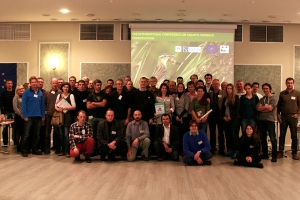
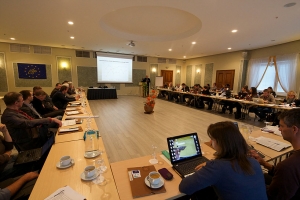
Presentations:
Session I: Latest developments and scientific research on ecology and conservation of Aquatic Warbler
- Martin Flade. Overview on the Aquatic Warbler global population dynamics, occurring challenges and successes for its conservation
- Žydrūnas Preikša & Žymantas Morkvėnas. Aquatic Warbler peripheral populations dynamics and its possible reasons in Lithuania
- Zsolt Vegvari. Possible causes of population decline of the Aquatic Warbler in Hungary
- Anatolii Poluda. Aquatic Warbler core population dynamics and its possible reasons in Ukraine
- Franziska Tanneberger & Jochen Bellebaum. Aquatic Warbler peripheral populations dynamics and its possible reasons – Pomerania
- Colonel Ibrahima Diop & Cosima Tegetmeyer. Aquatic Warbler in wintering sites (Senegal)
- Volker Salewski, Anja Ritz, Julio Canales-Delgadillo, Martin Flade, Michael Wink & Judith Korb. Latest preliminary insights into Aquatic Warbler population genetics
- Justyna Kubacka. Aquatic Warbler breeding productivity and its response to mowing – results of research in Poland, conclusions for conservation
- Jochen Bellebaum & Vera Knöfler. Outcomes of the Aquatic Warbler breeding success study 2011 in Lithuania
- Andrey Mukhin. Dispersal in highly fragmented habitats – Reed Warbler case
- Alexander Kozulin, Leonid Sokolov & Lubov Vergeichik. Recovery of breeding population of Aquatic Warbler in Žuvintas Biosphere Reserve (development and testing of young birds’ relocation method)
- Norbert Schaffer. Review on reintroductions of passerines/trans-sahara migrants: existing experiences and lessons learned
Session II: Conservation of the Aquatic Warbler: scientific perspective and practical experiences
- Jarosław Krogulec. Experience and lessons learned from conservation of Aquatic Warbler in Poland, selected aspects of habitat management challenges, monitoring and cooperation with stakeholders
- Wiktor Kotowski, Ewa Jablonska & Helena Bartoszuk. Snow grooming vehicles as wetland mowers: what side effects do they have on plant diversity? Report from the Biebrza National Park (Poland)
- Žymantas Morkvėnas. Experience and lessons learned from Aquatic Warbler habitat management in Lithuania: stakeholder involvement and communication aspects, technological solution for mowing fen mires
- Alexander Kozulin &Uladzimir Malashevich. The strategy of Aquatic Warbler conservation under conditions of habitat degradation and fragmentation in Belarus
- Aliaksandr Volchak, Aleh Meshyk, Mikalai Sheshka & Uladzimir Malashevich. Hydrological modelling – a conservation tool for the world’s biggest Aquatic Warbler breeding site, Zvaniec mire
Poster session
- Project “Baltic Aquatic Warbler” (LIFE09 NAT/LT/000233)
- Arūnas Balsevičius & Ričardas Narijauskas. Changes of tall sedge communities in Šyša polder (2011–2013)
- Cosima Tegetmeyer & Nina Seifert. Aquatic Warbler population size and habitat suitability in the Djoudj area (Senegal)
- Raphaël Musseau, Valentine Herrmann, Sophie Bénard, Christian Kerbiriou, Thomas Herault, Estelle Kerbiriou & Frédéric Jiguet. Migration stopover strategy of the Aquatic Warbler Acrocephalus paludicola at Gironde estuary and consequences for estuarine wetland habitats management
- Júlio M. Neto. Migration of Aquatic Warblers in Portugal
- Nerijus Zableckis. Impact of combined grazing and mowing on flooded meadows of Nemunas Delta
- Oskars Keišs & Jānis Reichmanis. Status and conservation of the Aquatic Warbler in Latvia
- Rguibi Idrissi Hamid, Provost Pascal, Malki Meryem & Jiguet Fréderic. Autumn migration for the globally threatened Aquatic Warbler Acrocephalus paludicola in Morocco: First ringing data
Session III: Rural development plan as a tool to secure Aquatic Warbler conservation: current experience, successes and challenges
- Žymantas Morkvėnas. Support to farmers through rural development programmes – agri-environmental measures designed for Aquatic Warbler conservation – comparative presentation about agri-environmental measures in different countries
- Jochen Bellebaum, Holger Pfeffer & Hermann Hötker. Advances and challenges of current agri-environmental measures for meadowbird conservation
Session IV: Seeking for self-sustaining farming systems to ensure long-term perspective of Aquatic Warbler conservation
- Wendelin Wichtmann & Franziska Tanneberger. Self-sustaining farming mechanisms in wet fen mires
- Dariusz Gatkowski. Production of biofuel from biomass gathered from late mowing of Aquatic Warbler habitat: workflow experience, cooperation with local farmers, marketing aspects – first experiences from Poland
- Valdas Balčiūnas. Economic aspects of farming in Aquatic Warbler habitats in Lithuania: a real economic-sound farming experience or providing a service in delivery of public good





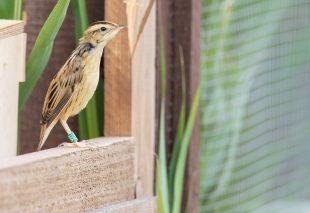
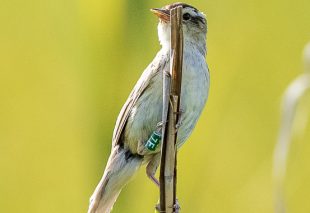


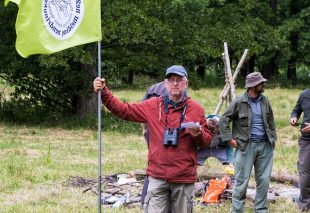


No comments!